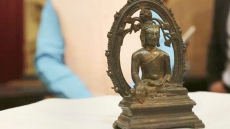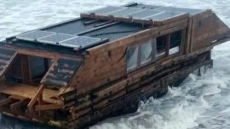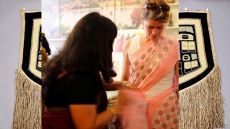Miykhaela reaches back in her memory to the summer day when it all began.
Her older brother had taken her into the bush on their northern Ontario reserve to join a few of their cousins, young teenaged boys like her sibling who had all been attending residential school together for several years.
They gang-raped her.
She was five or six years old.
As a mother years later, Miykhaela had to confront the ugly reality of familial sex abuse once again — but this time it was her daughter, who one day confessed that her teenaged half-brother had raped her a couple of years earlier.
She was 10 or 11 years old.
Miykhaela and her daughter are just two of the faces of intergenerational sexual abuse, a dark legacy connected to almost 120 years of government-sanctioned, church-operated residential schools, where aboriginal leaders say many First Nations, Metis and Inuit children were physically and sexually molested by clergy and other staff, spawning a cycle of mimicked behaviour in generations to come.
Extensive interviews with social scientists, indigenous leaders and victims undertaken over the past few months by The Canadian Press suggest child sexual abuse is an open secret in many aboriginal communities — and its prevalence in some is shockingly high.
"Few came out of residential schools having learned good boundaries, and good boundaries included some sense of self-determination, sovereignty over your own body," says Sylvia Maracle, executive director of the Ontario Federation of Indigenous Friendship Centres, based in Toronto.

"They didn't have any control over that, and they didn't see people around with appropriate behaviour and being respectful of them as human beings, that they were sacred. And they were abused, " says Maracle, a Mohawk from eastern Ontario's Tyendinaga First Nation.
"Children learn what they live and that was their life."
Being so young at the time, Miykhaela has little memory of the physical assault itself. "I don't remember the body ... but it probably did hurt me a lot," she says, reliving the event that occurred roughly five decades ago.
She does recall, though, how it made her feel: "I felt like I didn't matter. I was not valued. I was a thing for them to do what they wanted to."
Trauma expert Dr. Jacqui Linder says childhood sexual abuse affects multiple aspects of survivors' lives, including their sense of physical autonomy and self-worth.
"So many, many survivors talk about feeling filthy or dirty or defiled," says Linder, clinical director of Edmonton's Little Warriors program for sexually abused children, about a third of them aboriginal. "And so that dirtiness, the dirty-girl syndrome, becomes a part of their identity, which is incredibly self-destructive."
And it's not only girls. One in three of the children who come to Little Warriors' Be Brave Camp for intensive therapy to treat abuse-related post-traumatic stress disorder are boys, many of whom may feel emasculated or struggle with their gender identity.
"One of the things that people fail to understand is the magnitude of the damage that sexual violation of all kinds does, but particularly to children, mostly because children's identities are just being developed at that time," says Linder.

That damage, numerous studies have found, leads to high rates of depression, substance abuse, eating disorders and suicidal tendencies.
Miykhaela, an Anishinaabe woman who asked that her real name not be used to protect her family, knows this pattern all too well.
Haunted by images of the early incest and suffering bouts of intense anger and depression, she started down a path well-worn by countless other sexual abuse survivors: she turned to alcohol and drugs to blunt the pain of the childhood trauma, which had left her unsure of her identity, unsure of her role as a woman, unsure of her worth as a human being.
Over the years, she has done a lot of healing work, turning to centuries-old indigenous traditions such as pow-wow dancing, sweat lodges and sharing circles to strengthen her identity and give her solace. In her mid-30s, she went to university and has since worked in the social services field.
Living in Winnipeg, Miykhaela was finally able a few years ago to get sober and drug-free with the help of 12-step programs. Yet the spectre of her childhood trauma and the destructive behaviours it bred — along with her own memories of being physically abused at her Roman Catholic residential school — continue to sabotage her sense of well-being.
"My parents thought I would forget because I was so young, but I didn't," she says of the incest.
"It became part of my negative self-esteem and that still lives today. That negative self-esteem had me reaching out all my life to men, to alcohol, the cocaine addiction. I've quit the addictions, but now it's food.
"I'm still that little girl looking for something to make me feel better."

Still, it's not only her own experiences and struggles she laments, but also the multi-generational damage that continues to echo through her family, community and virtually the entire culture of Canada's First Peoples.
"I know every single one of my cousins have been sexually abused by somebody in their family ... I don't know one Indian residential school survivor that doesn't use something to try to feel better — not one," she says, including her late parents, who spent years drowning their own memories in the bottle.
Relationships within families, and often with other members of close-knit and insular indigenous communities, have been "so broken," sighs Miykhaela, who is estranged from most of her brothers because the trust that's naturally inherent among siblings has been destroyed.
"Something happened to them obviously when they went to residential school. They came back angry and shamed ... and my brothers were not attached to me anymore. That is the greatest injury because it never got fixed, even today.
"And I think we're going to die that way."




